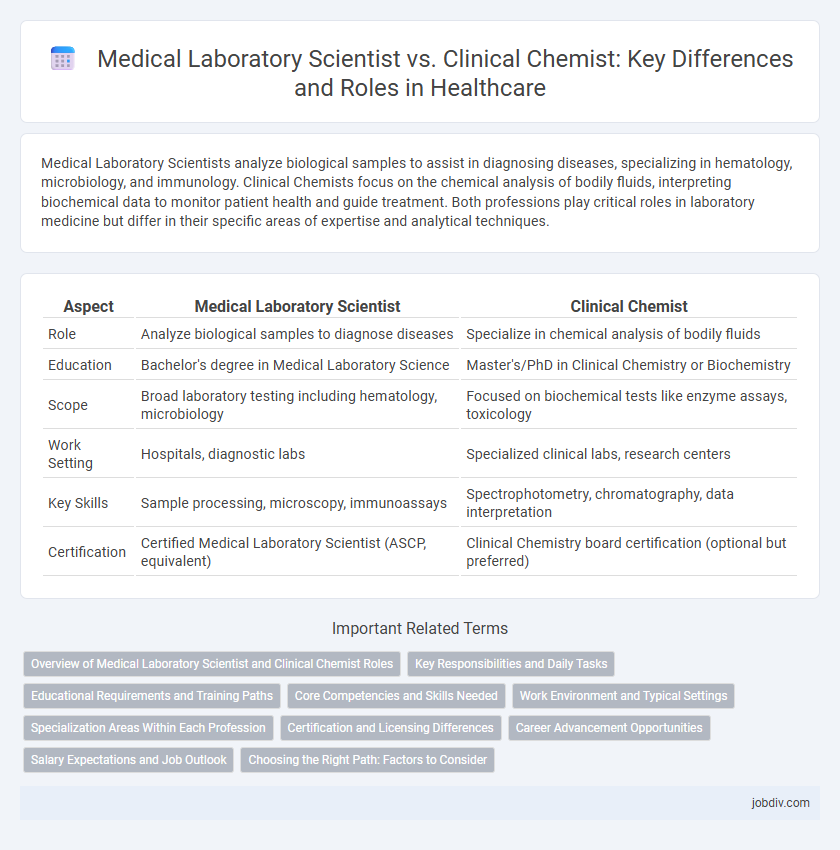Medical Laboratory Scientists analyze biological samples to assist in diagnosing diseases, specializing in hematology, microbiology, and immunology. Clinical Chemists focus on the chemical analysis of bodily fluids, interpreting biochemical data to monitor patient health and guide treatment. Both professions play critical roles in laboratory medicine but differ in their specific areas of expertise and analytical techniques.
Table of Comparison
| Aspect | Medical Laboratory Scientist | Clinical Chemist |
|---|---|---|
| Role | Analyze biological samples to diagnose diseases | Specialize in chemical analysis of bodily fluids |
| Education | Bachelor's degree in Medical Laboratory Science | Master's/PhD in Clinical Chemistry or Biochemistry |
| Scope | Broad laboratory testing including hematology, microbiology | Focused on biochemical tests like enzyme assays, toxicology |
| Work Setting | Hospitals, diagnostic labs | Specialized clinical labs, research centers |
| Key Skills | Sample processing, microscopy, immunoassays | Spectrophotometry, chromatography, data interpretation |
| Certification | Certified Medical Laboratory Scientist (ASCP, equivalent) | Clinical Chemistry board certification (optional but preferred) |
Overview of Medical Laboratory Scientist and Clinical Chemist Roles
Medical Laboratory Scientists perform essential diagnostic tests by analyzing blood, tissues, and other body fluids, ensuring accurate patient data for effective treatment plans. Clinical Chemists specialize in the chemical analysis of bodily fluids to detect abnormalities, focusing on biochemical markers related to metabolic and genetic disorders. Both roles require expertise in laboratory techniques and contribute critically to patient diagnosis, but Clinical Chemists often engage more deeply in research and assay development for clinical applications.
Key Responsibilities and Daily Tasks
Medical Laboratory Scientists perform diagnostic tests on patient samples, analyze blood, tissues, and body fluids, and maintain laboratory equipment to ensure accurate results. Clinical Chemists specialize in analyzing chemical components of bodily fluids, interpreting biochemical data, and developing new testing methods to monitor disease progression and treatment efficacy. Both roles require strict adherence to quality control protocols, data analysis, and collaboration with healthcare professionals for patient diagnosis and management.
Educational Requirements and Training Paths
Medical Laboratory Scientists typically hold a bachelor's degree in medical laboratory science or a related field, with training encompassing hematology, microbiology, and immunology. Clinical Chemists often require advanced degrees such as a master's or Ph.D. in clinical chemistry or biochemistry, focusing on analyte measurement, instrument calibration, and disease marker interpretation. Both professions involve rigorous clinical training, but Clinical Chemists usually undergo specialized residencies or fellowships in chemical pathology to hone analytical and diagnostic skills.
Core Competencies and Skills Needed
Medical Laboratory Scientists possess expertise in microbiology, hematology, and immunology, with skills in specimen analysis, laboratory instrumentation, and quality control. Clinical Chemists specialize in biochemical analysis, focusing on enzyme assays, toxicology, and metabolic diagnostics, requiring proficiency in analytical techniques and data interpretation. Both roles demand strong problem-solving abilities, attention to detail, and knowledge of laboratory safety protocols to ensure accurate diagnostic results.
Work Environment and Typical Settings
Medical Laboratory Scientists typically work in hospital laboratories, diagnostic centers, and public health facilities, handling diverse biological samples to perform routine and specialized tests. Clinical Chemists often operate in clinical laboratories and research institutions, focusing on biochemical analysis and interpretation of complex chemical data related to patient health. Both roles require controlled, sterile environments with advanced instrumentation, but Clinical Chemists are more likely to engage in research-driven settings or academic hospitals.
Specialization Areas Within Each Profession
Medical Laboratory Scientists specialize in hematology, microbiology, immunology, and molecular diagnostics, focusing on diverse laboratory testing to support disease diagnosis and monitoring. Clinical Chemists concentrate primarily on biochemical analysis of body fluids, including enzymology, toxicology, and endocrinology, to understand metabolic disorders and chemical imbalances. Both professions require in-depth expertise, but Clinical Chemists often engage in method development and quality control in clinical chemistry laboratories.
Certification and Licensing Differences
Medical Laboratory Scientists typically require certification from organizations such as the American Society for Clinical Pathology (ASCP) and state-specific licensure to practice, emphasizing proficiency in hematology, microbiology, and immunology. Clinical Chemists often hold advanced degrees in chemistry or biochemistry and may obtain certification through the American Board of Clinical Chemistry (ABCC), focusing on analytical techniques and biochemistry applications in clinical diagnostics. Licensing requirements for Clinical Chemists can vary by state and are generally less standardized compared to Medical Laboratory Scientists, reflecting their specialized role in laboratory medicine.
Career Advancement Opportunities
Medical Laboratory Scientists can advance by specializing in areas such as hematology, microbiology, or molecular diagnostics, often progressing to supervisory or managerial roles in hospital labs. Clinical Chemists typically pursue further qualifications in biochemistry or clinical pathology, enabling them to lead research projects or develop diagnostic assays in specialized clinical settings. Both careers offer opportunities in academia, research, and healthcare administration, with Clinical Chemists frequently engaging in translational medicine and Medical Laboratory Scientists expanding into laboratory information systems management.
Salary Expectations and Job Outlook
Medical Laboratory Scientists typically earn an average salary ranging from $55,000 to $75,000 annually, with variations based on location and experience, while Clinical Chemists often command higher salaries, averaging between $70,000 and $90,000 due to their specialized expertise in biochemical analysis. The job outlook for Medical Laboratory Scientists is projected to grow by 11% over the next decade, driven by increasing demand for diagnostic testing in healthcare. Clinical Chemists also face strong demand, with an estimated growth rate of 10%, supported by advancements in clinical diagnostics and personalized medicine.
Choosing the Right Path: Factors to Consider
Medical Laboratory Scientists focus on analyzing biological samples to detect diseases, while Clinical Chemists specialize in the chemical composition of bodily fluids to monitor health and diagnose conditions. Choosing the right path depends on your interest in hands-on laboratory techniques versus chemical analysis, as well as career goals like research involvement or clinical diagnostics. Consider educational requirements, certification options, and job market demand when deciding between these two critical health professions.
Medical Laboratory Scientist vs Clinical Chemist Infographic

 jobdiv.com
jobdiv.com